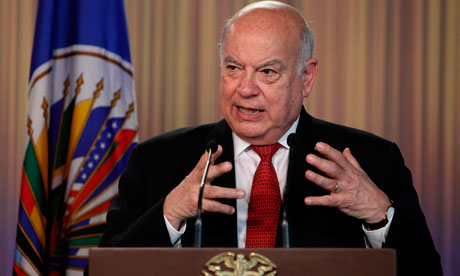From - http://www.guardian.co.uk/politics/2013/may/18/drugspolicy-drugs-trade
In an open letter, former Latin American leaders call for legal regulation to help undermine organised crime

After more than four decades of a failed war on drugs, calls for a change in strategy are growing louder by the day. In Latin America, the debate is positively deafening. Statesmen from Colombia, Guatemala, Mexico and Uruguay are taking the lead for transformations in their own drug regime, which has set a strong dynamic of change across the region and around the world. Their discussion has expanded to the US, where public opinion toward regulation is also changing.
For the first time, the majority of Americans support regulated cannabis for adult consumption. Nowhere has this support been more evident than in Colorado and Washington, states that recently approved new bills to this effect. This shift in public opinion presents a direct challenge to the US federal law, but also to the United Nations drug conventions and the international drug policy regime.
The Global Commission on Drug Policy, building on the call for a paradigm shift formulated by the Latin American Commission on Drugs and Democracy, has called loudly for precisely these kinds of changes since 2011. Twenty global leaders have highlighted the devastating consequences of repressive drug policies on people, governance and economies not just in Latin America, but around the world.
Our flagship report – War on Drugs – sets out two main recommendations: (i) replace the criminalisation of drug use with a public health approach, and (ii) experiment with models of legal regulation designed to undermine the power of organised crime. By brokering a genuinely global conversation on drug policy reform, we broke a century-old taboo.
A new unexpected voice was added to the debate on drug policy reform. The Secretary General of the Organization of American States (OAS) José Miguel Insulza presented Colombian President Santos with the findings of a much anticipated report on alternative scenarios for drug control and regulation for the Americas. The study itself was originally the idea of Santos and endorsed by all heads of American states at the 2012 Summit of the Americas in Cartagena.
The OAS-backed study proposes four possible scenarios for future drug policy reflecting an emerging consensus across Latin America. Fortunately, none of the scenarios call for the status quo. Most experts endorse the first three scenarios – the shift from repressive approaches to ones that privilege citizen security, the experimentation with different approaches to regulating illegal drugs, and the strengthening of community resilience. Obviously, all serious leaders agree that the fourth scenario, the threat of creating narco-states, is to be avoided at all costs. Taken together, the report represents the first comprehensive treatment of drug policy reform from a multilateral organisation.
The OAS study sets out complementary, rather than mutually excluding paths. They are based on the realistic expectation that demand for psychoactive substances will continue to exist over the coming decade and that only a small proportion of users will become dependent. In fact, many states are already decriminalising drug use and experimenting with cannabis regulation, while also investing in harm reduction programmes including the medical supply of harder drugs. Rather than causing problems as predicted by their critics, they are generating positive and measurable results.
The OAS and countries across Latin America are positively contributing to the breaking of the taboo that blocked for so long the debate on more humane and efficient drug policy. It is time that governments around the world are allowed to responsibly experiment with regulation models that are tailored to their realities and local needs. The leadership demonstrated by President Santos and the OAS secretary general is welcomed. But the report is just the start – leaders across the Americas need to take this study seriously and consider how their own policies can be improved. In doing so, they will be breaking the vicious cycle of violence, corruption, and overcrowded prisons and will put people's health and security first.
Fernando Henrique Cardoso
former president of Brazil, chair
Cesar Gaviria
former president of Colombia
Ricardo Lagos
former president of Chile
George P. Shultz
former Secretary of State, United States, honorary chair
Paul Volcker
former Chairman of the United States Federal Reserve and of the Economic Recovery Board
Louise Arbour
former UN High Commissioner for Human Rights, President of the International Crisis Group
Ernesto Zedillo
former president of Mexico

